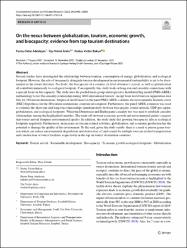| dc.contributor.author | Adedoyin, Festus Fatai | |
| dc.contributor.author | Alola, Uju Violet | |
| dc.contributor.author | Bekun, Festus Victor | |
| dc.date.accessioned | 2023-08-12T14:57:45Z | |
| dc.date.available | 2023-08-12T14:57:45Z | |
| dc.date.issued | 2022 | en_US |
| dc.identifier.issn | 0944-1344 | |
| dc.identifier.issn | 1614-7499 | |
| dc.identifier.uri | https://hdl.handle.net/11363/5288 | |
| dc.description.abstract | Several studies have investigated the relationship between tourism, consumption of energy, globalization, and ecological
footprint. However, the role of biocapacity alongside tourism development in environmental sustainability is yet to be documented in the extant literature. No doubt, the biocapacity of a country, its level of tourist’s arrival, as well as globalization
all contribute immensely to ecological footprint. Consequently, this study looks at long-run and causality connections with
a special focus on bio-capacity. The study uses the pooled mean group-autoregressive distributed lag model (PMG-ARDL)
methodology to test the causality relationship during 2016 international tourists’ receipt from world tourism organization data
fles for 10 tourism destinations. Empirical result based on the panel PMG-ARDL confrms the environmental Kuznets curve
(EKC) hypothesis for the 10 tourism destinations countries investigated. Furthermore, the panel ARDL estimator was used
to estimate the short-run and long-run relationships simultaneously between biocapacity, tourist arrivals, GDP per capita,
globalization, and ecological footprints. While the Dumitrescu and Hurlin panel causality test was used to establish causality
relationships among the highlighted variables. The trade-of between economic growth and environmental quality suggests
that tourist arrival dampens environmental quality. In addition, the study fnds that growing biocapacity afects ecological
footprints negatively. Furthermore, an increase in tourism-related activities, globalization, and economic production has the
potential to damage the quality of the environment. To this end, given the study results, there is a need to pursue green tourism which can reduce environmental degradation and destruction of land caused by multiple tourism-related transportation
and construction of tourist facilities respectively in the top ten tourist destination countries. | en_US |
| dc.language.iso | eng | en_US |
| dc.publisher | SPRINGER HEIDELBERG, TIERGARTENSTRASSE 17, D-69121 HEIDELBERG, GERMANY | en_US |
| dc.relation.isversionof | 10.1007/s11356-021-17651-8 | en_US |
| dc.rights | info:eu-repo/semantics/openAccess | en_US |
| dc.rights | Attribution-NonCommercial-NoDerivs 3.0 United States | * |
| dc.rights.uri | http://creativecommons.org/licenses/by-nc-nd/3.0/us/ | * |
| dc.subject | Tourist arrival | en_US |
| dc.subject | Sustainable development | en_US |
| dc.subject | Bio-capacity | en_US |
| dc.subject | Economic growth ecological footprints | en_US |
| dc.subject | Globalization | en_US |
| dc.title | On the nexus between globalization, tourism, economic growth, and biocapacity: evidence from top tourism destinations | en_US |
| dc.type | article | en_US |
| dc.relation.ispartof | Environmental Science and Pollution Research | en_US |
| dc.department | İktisadi İdari ve Sosyal Bilimler Fakültesi | en_US |
| dc.authorid | http://orcid.org/0000-0002-0464-4677 | en_US |
| dc.identifier.volume | 29 | en_US |
| dc.identifier.issue | 17 | en_US |
| dc.identifier.startpage | 24995 | en_US |
| dc.identifier.endpage | 25005 | en_US |
| dc.relation.publicationcategory | Makale - Uluslararası Hakemli Dergi - Kurum Öğretim Elemanı | en_US |
| dc.contributor.institutionauthor | Bekun, Festus Victor | |



















